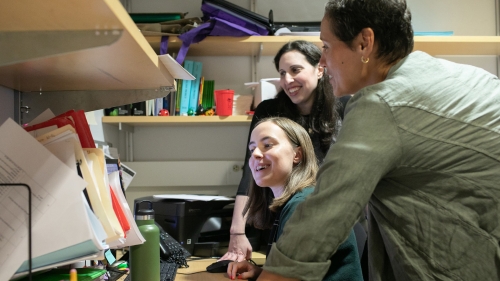

As an applied psychologist, I use empirical research methods to better understand the needs of children and families, and to arm professionals and policy makers with this knowledge so as to better address the needs of the most vulnerable. The goal that unites all of my work is to enhance the lives of marginalized children using development in context as a general framework. I focus on immigrant children in New York, Muslim youth in the US, refugees in Turkey and Norway, and students at risk in US schools.
I have published my work in top journals, such as Child Development, Developmental Psychology, Review of Educational Research, and Pediatrics, in an effort to inform scholars, practitioners, and policy makers about marginalized children. I have also made a concerted effort to get my work to a wider audience both locally and globally, as I believe strongly in “giving scientific knowledge away.” I have served on several policy committees such as the National Academy of Sciences, the Urban Institute, and the Migration Policy Institute. I have collaborated with UNESCO and Save the Children, in their efforts to improve the lives of refugee children.
Please visit my lab's web page for most recent work and volunteering opportunities. https://wp.nyu.edu/sirin/
For those from Turkey here is my Turkish web page: http://www.selcuksirin.com/
Turkçe web sayfam için lütfen şu sayfayı ziyaret edin: http://www.selcuksirin.com/
Selected Publications
*graduate, or **undergraduate student at time of publication
Sirin, S. R., & Sin, E. J.* (2023). Meta-Analysis on the relation between acculturation and academic performance: Testing the immigrant paradox. Educational Research Review. https://doi.org/10.1016/j.edurev.2023.100526
Lee, C.*, Sirin, S. R., Choi, E.*, & Sin, E.* (2023). Meta-Analysis of Acculturation and Suicide-Related Outcomes: A Test of the Immigrant Paradox, Journal of Racial and Ethnic Health Disparities. https://doi.org/10.1007/s40615-023-01572-y
Sirin, S. R., Choi, E.*, & Sin, E. J.* (2022). Meta-analysis on the relation between acculturation and alcohol use among immigrant youth. Journal of Adolescent Health, 70(3). 361-377. https://doi.org/10.1016/j.jadohealth.2021.09.021
Sirin, S.R., Choi, E.* & Tugberk, C.* (2021). The Impact of 9/11 and the War on Terror on Arab and Muslim Children and Families. Current Psychiatry Reports 23, 47 (2021). https://doi.org/10.1007/s11920-021-01264-6
Ryce, P.*, Sirin, S.R., Rogers-Sirin, L., Sin, E.*, & Palmieri, J**. (2021). The role of internalizing mental health problems in substance use trajectories for minority adolescents. International Journal of Mental Health Addiction, 19, 2031-2044. https://doi.org/10.1007/s11469-020-00298-w
Sirin, S. R., Sin, E.J*, Clingain, C*., & Rogers-Sirin, L. (2019). Acculturative stress and mental health: Implications for immigrant-origin youth. Pediatric clinics of North America, 66(3), 641–653. https://doi.org/10.1016/j.pcl.2019.02.010
Sirin, S. R., Plass, J. L., Homer, B. D., Vatanartiran, S., & Tsai, T. (2018). Digital game-based education for Syrian refugee children: Project Hope. Vulnerable Children and Youth Studies, 13(2), 1-6. https://doi.org/10.1080/17450128.2017.1412551
Sirin, S. R., Rogers-Sirin, L., Cressen*, J., Gupta*, T., Ahmed**, S., & Novoa**, A. (2015). Discrimination related stress effects on the development of internalizing symptoms among Latino adolescents. Child Development, 86(3), 709-725. https://doi.org/10.1111/cdev.12343
Sirin, S. R., Gupta, T.*, Ryce*, P., Katsiaficas, D.*, Suarez-Orozco, C., & Rogers-Sirin, L. (2013). Understanding the role of social support in trajectories of mental health symptoms for immigrant adolescents. Journal of Applied Developmental Psychology, 34(5), 199-207. https://doi.org/10.1016/j.appdev.2013.04.004
Sirin, S. R., Ryce*, P., Gupta*, T., & Rogers-Sirin, L. (2013). The role of acculturative stress on mental health symptoms for immigrant adolescents: A longitudinal investigation. Developmental Psychology, 49(4), 736-748. https://doi.org/10.1037/a0028398
Sirin, S. R. (2005). Socioeconomic status and academic achievement: A meta-analytic review of research. Review of Educational Research, 75(3), 417-453. https://doi.org/10.3102%2F00346543075003417


